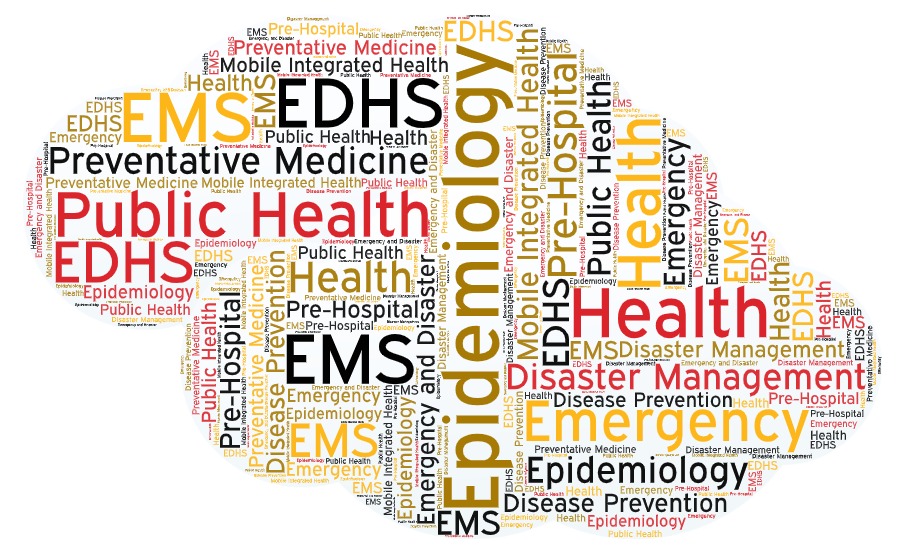Preventive Medicine & Epidemiology Track II Course Plan: Download PDF
Program Description:
Our Preventive Medicine/Epidemiology track is designed for students who desire to work in the prevention and response to events that may or may not be based on trauma. This may include outbreaks of infectious diseases, mass complex emergencies, such as earthquakes or hurricanes that require a response to diseases as well as injuries in an environment in which access to healthcare has suddenly become limited. Students find that mixing strategies for emergency management and public health gives them a wide range of potential career pathways.
Required Core Courses are offered every year. Most other EDHS courses are offered on a rotating 2-year cycle. Please see EDHS Graduate Courses for scheduled course offerings.
NOTE: We are in the process of revising our graduate curriculum to better prepare students for the future. Curriculum revisions for new students will be in effect for FALL 2025 but are not yet reflected here. Please speak with an advisor to assist in navigating the upcoming requirements for the EDHS Master’s degree.
Core Courses (6 credits required)
EDHS 630: Issues Analysis and Proposal Writing (3) Offered Spring Semesters
EDHS 640: Introduction to High-Performance EDHS (3) Offered Fall Semesters
Methods Requirement (6 credits required – 1 Epidemiology & 1 Biostatistics course)
CHOOSE ONE 3-Credit Course (EDHS 620 OR MHS 630)
EDHS 620: EDHS Epidemiology and Research Methods (3) Offered Fall Semesters
MHS 630: Essentials for Chronic and Infectious Disease Epidemiology Perspective (UMB) (3)* Offered Spring Semesters
CHOOSE ONE 3-Credit Course (EDHS 621 OR MHS 615)
EDHS 621: Advanced Methods: Biostatistics (3) Offered Spring Semesters
MHS 615: Biostatistics for the Health Professional (UMB) (3) Offered Fall Semesters
NOTE: Equivalent graduate-level courses are available at other USM institutions through inter-institutional enrollment
Electives (18 total credits required)
Non-Thesis Option:
(15 Elective credits, at least one from each group, and 3 Special Studies credits)
Thesis Option:
(12 Elective credits, at least one from each group, and 6 Special Studies credits)
GROUP I Electives: Choose at least one of the following
- EDHS 623: Public Health Emergency Preparedness (3) Offered Fall Semesters
- EDHS 632: Social, Behavioral, Health Aspects of Emergencies & Disasters (3) Under Revision – Currently not available
- CIPP 960: Critical Issues in Global Women’s & Children’s Health (UMB) (3)*
- MHS 605: Perspectives on Global Health (UMB) (3)*
- MHS 610: National/Int’l Approaches to Healthcare Delivery (UMB) (3)*
- MHS 639: Health Implications of Mass Violence and Disaster (UMB) (3)*
- MHS 631: Global Non-Communicable (NCD) Epidemiology (UMB) (3)
- PUBL 600/SOCY 600: Research Methodology (3)
- PUBL 604: Statistical Analysis (3)
- SOCY 618: SAS for Social Scientists (3)
GROUP II Electives: Choose at least one of the following
- EDHS 609: Guided Introduction to EMS Research (3) Instructor Approval Required
- EDHS 633: Refugee Health Services (3) Under Revision – Currently not available
- EDHS 634: Disaster Mitigation (3) Offered Fall Semesters – Even Years
- EDHS 636: Organizational Management and Leadership (3) Offered Spring Semesters – Odd Years
- EDHS 637: Emergency and Disaster Response and Recovery (3) Offered Fall Semesters – Odd Years
- EDHS 638: Emergency and Disaster Mitigation, Planning, and Preparedness (3) Offered Spring Semesters – Even Years
- EDHS 639: International Disaster Management (3) Varies starting 2024
- EDHS 720: Evidence-Based Program Planning Implementation, & Evaluation for Emergency and Disaster (3) Offered Spring Semesters – Even Years
- PUBL 601: Political and Social Context of Policy (3)
- PUBL 603: Theory and Practice of Policy Analysis (3)
- PUBL 652: Politics of Health (3)
- SOCY 620: Social Epidemiology (3)
- SOCY 655: Disability and Rehabilitation (3)
GROUP III Special Studies: Choose one of the following
EDHS 790: Capstone Research Project (topical) (3) Offered Fall and Spring Semesters
– OR –
EDHS 799: Master’s Thesis Research (6) Offered Fall and Spring Semesters
Total Required Credits: 30
Preventive Med& Epidemiology Track II Course Plan: Download PDF
For Degree requirements for students enrolled prior to 2016, please contact Graduate Program Director
*UMB Global Studies certificate courses may be taken through UMBC inter-institutional enrollment, but students wishing to graduate with the certificate separately must apply to the UMB Global Certificate program. Speak to an advisor for more information.
